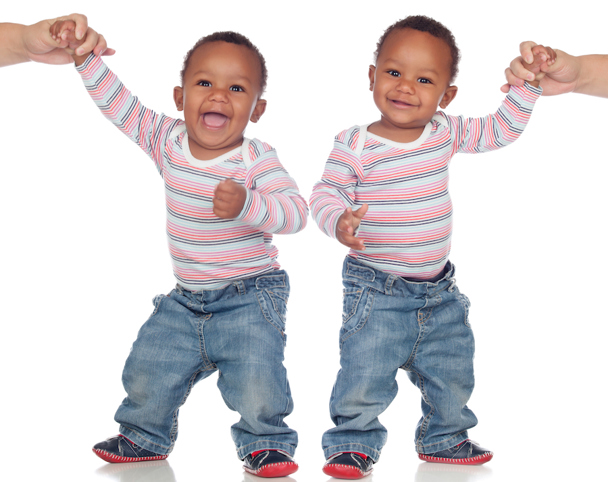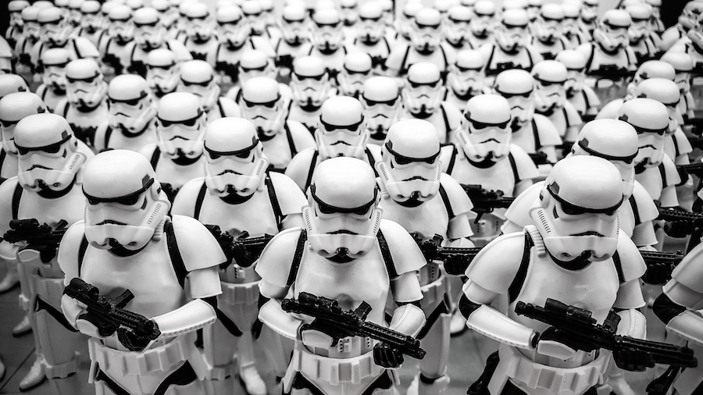
Do clones have anything in common other than the way they look?
June 14, 2011

- Related Topics:
- Quirky questions,
- Futuristic science,
- Environmental influence,
- Cloning
A curious adult from California asks:
"Do clones have anything in common other than the way they look?"
Awesome question. Let's pretend you are writing a sci-fi screenplay; most movies have a hard time getting science right and I've always wanted to be a Science Consultant to the Stars!
Yes, clones have something else in common. They have the exact same genes, just like identical twins.
We all know that identical twins look alike. But studies have shown that their shared genes can make other things alike too. Like temperament or IQ. Or the chance they'll get certain diseases. Or even what they like to do on weekends.
Identical twins can also be different. This becomes more apparent as they age and natural changes happen in their DNA.
So your movie clones will look alike. They might also have similar personalities and medical conditions. But they could be pretty different too.
Seeing Double
If you know any identical twins, you know they aren't exactly the same. That's because the environment, like diet and viral infections, can affect who you are and what you look like. You are a combination of your genes and your environment.
Clones are bound to be even more different from each other than identical twins because clones will develop in different wombs, at different times. And they will grow up in different times too. A child growing up in 1980 will probably be different from the same child growing up in 2010, even if they share the same genes!
What we can say from this is that any traits that are only influenced by genes and not the environment would be the same for our clones. Others that are affected by the environment might be different. And there are a lot of those.
Identical twins come from a single fertilized egg, or zygote, that splits in two. Both halves contain the same DNA and eventually form two fetuses. But clones are formed in a different way.
The first step in making a clone is to empty the DNA out of a fertilized egg. This egg will eventually house the DNA of your clone. Next, you take DNA from the individual you want to clone, treat it in a certain way, and then put it into the empty fertilized egg. The fertilized egg is then put into a surrogate womb where it develops and grows.

For example, maybe your movie clones will work like this. The original fertilized egg could develop like a normal human. It grows inside its mom and then after it is born, it has a normal human life. The other could develop in a crazy Star Wars tank and then grow up with robots for parents.
So your clones will not be exactly the same — even though they'd have the same genes — because of their wildly different pre- and post-birth environments. They may look pretty similar, but they'll almost certainly act differently.
Same but Different
There are some things that would almost certainly be the same for your clones. These would be traits that are hardly affected by the environment. So for example, your clones will probably have the same hair and eye color. They will have the same blood type and maybe some of the same genetic diseases.
But what about traits that are affected by the environment? We know your clones would be different, but how different? Since no one has cloned a human yet, we don't know for sure. But we can use identical twins that were raised apart to make some guesses.
Your clones might have similar personality traits. One study looked at over one hundred pairs of identical twins who were separated at birth. These identical twins had the same genes but they grew up with different parents, in different places.
The researchers found that the twins tended to have pretty similar personalities. Many of the twin pairs leaned towards the same occupational and leisure time interests. They also had similar temperaments, IQ scores, and social attitudes.

Clones would be less alike than these identical twins, because they developed in different environments before birth. But as we can see, having the same genes definitely would make clones more similar in terms of personality, IQ, and lots of other traits compared to pairs with different DNA.
So for your movie clones, one might be a musical prodigy, while the other is just pretty good. One of your clones might BASE jump off Yosemite’s Half Dome, while the other one might prefer jumping from 20 foot cliffs into bodies of water.
Odds are though that if one is a musical genius, the other won't be tone deaf. Or if one is a risk taker, the other won't be risk averse. No, they are bound to be more similar than any random two people because they share the same genes. But this won't be true of every trait. There are some traits where the environment can swamp the effect of genes.
For characteristics that are easily affected by the environment, your clones could be very different. For example, if one clone gets more sun, they could have a different skin tone or more freckles. The fingerprints of your clones will be different because those are formed in the womb. And depending on what they eat, they could be different heights and weights.
Nature vs Nurture
Your movie clones are a classic example of the "Nature vs. Nurture" question. How much does DNA contribute to who we are? And how much does the environment?
It turns out there are only a few things like blood type and eye color that are completely "nature." Most traits like personality and IQ are a combination of nature and nurture. Whether we reach our "genetic potential" or not depends on our environment.
In the movie Clone Wars, the clone-makers tried their best to control for environmental effects in their clones. The Stormtroopers are all the same height and probably look the same under that white armor.

But what would happen if Luke Skywalker was cloned? Is The Force completely genetic or does the environment play some role? Can't wait to see your film and find out!

Author: Carrie Metzinger
When this answer was published in 2011, Carrie was a Ph.D. candidate in the Department of Biology, studying plant cell fate and patterning in Dominique Bergmann's laboratory. Carrie wrote this answer while participating in the Stanford at The Tech program.
 Skip Navigation
Skip Navigation
